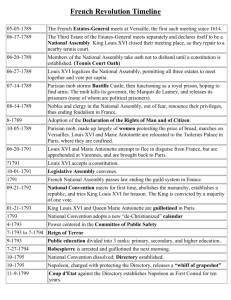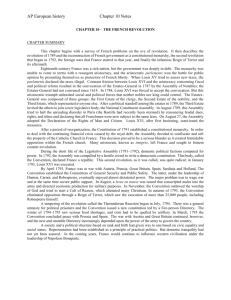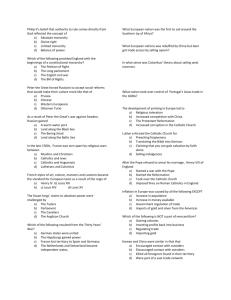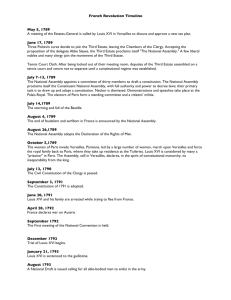Champ de Mars: Petitions of the Cordelier and Jacobin Clubs
advertisement
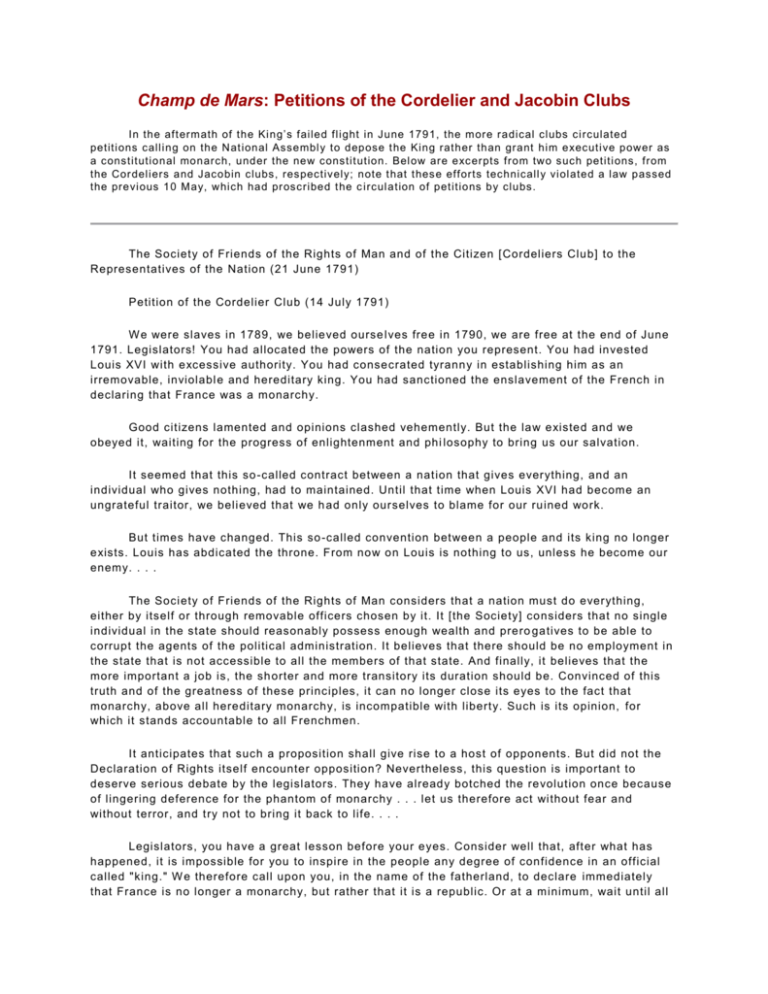
Champ de Mars: Petitions of the Cordelier and Jacobin Clubs In the aft ermath of the Ki ng’s failed fli ght i n June 1791, the more radical cl ubs ci rculated petiti ons calli ng on the Nat ional Assembl y to depose t he King rat her than grant him executi ve power as a constitutional monarch, under the new constit ution. Bel ow are exc erpts from two such petiti ons, from the Cor deli ers and J acobin clubs, respectively; note t hat t hes e eff orts technicall y vi ol ated a l aw passed the previ ous 10 May, which had pr oscribed t he c ircul ation of petitions by clubs. The Society of Friends of the Rights of Man and of the Citizen [Cordeliers Club] to the Representatives of the Nation (21 June 1791) Petition of the Cordelier Club (14 July 1791) W e were slaves in 1789, we believed ourse lves free in 1790, we are free at the end of June 1791. Legislators! You had allocated the powers of the nation you represent. You had invested Louis XVI with excessive authority. You had consecrated tyranny in establishing him as an irremovable, inviolabl e and hereditary king. You had sanctioned the enslavement of the French in declaring that France was a monarchy. Good citizens lamented and opinions clashed vehemently. But the law existed and we obeyed it, waiting for the progress of enlightenment and phi losophy to bring us our salvation. It seemed that this so -called contract between a nation that gives everything, and an individual who gives nothing, had to maintained. Until that time when Louis XVI had become an ungrateful traitor, we believed that we h ad only ourselves to blame for our ruined work. But times have changed. This so -called convention between a people and its king no longer exists. Louis has abdicated the throne. From now on Louis is nothing to us, unless he become our enemy. . . . The Society of Friends of the Rights of Man considers that a nation must do everything, either by itself or through removable officers chosen by it. It [the Society] considers that no single individual in the state should reasonably possess enough wealth and prero gatives to be able to corrupt the agents of the political administration. It believes that there should be no employment in the state that is not accessible to all the members of that state. And finally, it believes that the more important a job is, the sh orter and more transitory its duration should be. Convinced of this truth and of the greatness of these principles, it can no longer close its eyes to the fact that monarchy, above all hereditary monarchy, is incompatible with liberty. Such is its opinion, for which it stands accountable to all Frenchmen. It anticipates that such a proposition shall give rise to a host of opponents. But did not the Declaration of Rights itself encounter opposition? Nevertheless, this question is important to deserve serious debate by the legislators. They have already botched the revolution once because of lingering deference for the phantom of monarchy . . . let us therefore act without fear and without terror, and try not to bring it back to life. . . . Legislators, you ha ve a great lesson before your eyes. Consider well that, after what has happened, it is impossible for you to inspire in the people any degree of confidence in an official called "king." W e therefore call upon you, in the name of the fatherland, to declare immediately that France is no longer a monarchy, but rather that it is a republic. Or at a minimum, wait until all the departments and all of the primary assemblies have expressed their opinion on this important question before you consider casting the fai rest empire in the world into the chains and shackles of monarchism for a second time. The society has decided that the present petition shall be printed, posted, and then sent to all the departments and patriotic societies of the French empire. Petition of the Jacobin Club (16 July 1791) The Frenchmen undersigned, members of the sovereign; Considering that in matters affecting the safety of the people, it has the right to express its desire in order to enlighten and direct the representatives who have rece ived its mandate; that there has never been a more important question than that concerning the king's desertion; that the decree passed on 15 July contains no provision regarding Louis XVI; that while obeying this decree, it is important to decide promptly the matter of this individual's fate; that this decision must be based on his conduct; that Louis XVI, after having accepted the duties of kingship and sworn to defend the constitution, has deserted the post entrusted to him, has protested against this constitution by a declaration written and signed by his own hand, has sought to paralyze the executive power by his flight and orders, and to overthrow the constitution by his complicity with the men today accused of attacking it; that his betrayal, his dese rtion, protestation (to say nothing of all the other criminal acts preceding, accompanying, and following these) entail a formal abdication of the constitutional crown entrusted to him; that the National Assembly has judged him to this effect in taking ove r the executive authority, suspending the king's powers, and holding him under arrest; that new promises to observe the constitution on Louis XVI's part could not offer a sufficient guarantee to the nation against a new betrayal and a new conspiracy; Considering, finally, that it would be as contrary to the majesty of the outraged nation as to its interests to entrust the reins of the empire to a perfidious, traitorous fugitive; Formally and expressly demands that the National Assembly accept, in the nation 's name, Louis XVI's abdication on 21 June of the crown delegated to him, and provide for his replacement by all constitutional means. The undersigned declare that they will never recognize Louis XVI as their king, unless the majority of the nation express es a desire contrary to that contained in the present nation. Sourc e: Albert M at hiez, Le Club des Cordeliers pendant la c ris e de Varennes et le mass ac re du Champ de M ars (Genev a: Slatk ine, 1975), 45 –47, 135–36.

